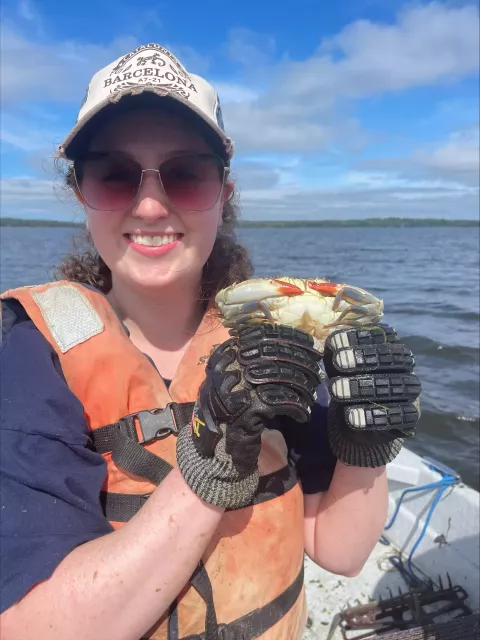
Caylin Grove is a genetics: genomics major from Hollis, New Hampshire, who is researching the presence of two diseases that affect oysters in Great Bay.
COLSA: Tell us about your research in as non-technical language as possible.
Caylin Grove: I research Multinucleated Sphere Unknown (MSX) and Dermo in eastern oysters in Great Bay. I specifically study the larval stages and use genetics to determine whether the oyster larvae are diseased.
COLSA: What challenge does your research seek to address?
Caylin: My research seeks to address disease in oysters within Great Bay and help contribute to the conservation of eastern oysters.
COLSA: Your work elevates research supported by the NH Agricultural Experiment Station. How will it benefit people, communities and/or the natural environment in New Hampshire?
Caylin: My work will help aid the conservation effort for eastern oysters in Great Bay. Oysters are a keystone species so my research will help improve the ecosystem of Great Bay and allow for more production of oysters.
COLSA: What are you learning as a result of you experience?
Caylin: I have learned so much about collecting samples, genetics, and how to create a project in research properly. I feel that I have learned so much through this experience and that it has set me up for graduate school or a job after college.

COLSA: Who are you working with? (Faculty, grad students, other undergrads)
Caylin: I work under Dr. Bonnie Brown and have assisted her on a couple of projects, but I work mainly under doctoral candidate Alyssa Strickland for my oyster research. I work alone, but I have helped with other projects in Dr. Brown's lab that include other graduate students and undergraduates.
COLSA: What should prospective students know about UNH?
Caylin: I think prospective students should know that UNH is what you make of it. Joining this lab is one of the best things I ever did, and I do not regret even a second of it. This experience has prepared me for life after my undergraduate degree and has been a fun experience as well.
COLSA: What do you love most about UNH?
Caylin: I love that UNH feels like home to me. The campus is beautiful and walkable, and the academics excite me about a career in my major. Joining a research lab as an undergraduate has provided me with many learning opportunities and I think has been a defining moment of my career at UNH.
The NH Agricultural Experiment Station helps improve New Hampshire's lives, livelihoods and landscapes through research and discoveries that sustain agricultural, food and forested ecosystems and supporting the development of future scientists. The Station research described above is based on work with joint funding from the USDA National Institute of Food and Agriculture under Hatch award number 7005577 and the state of New Hampshire.